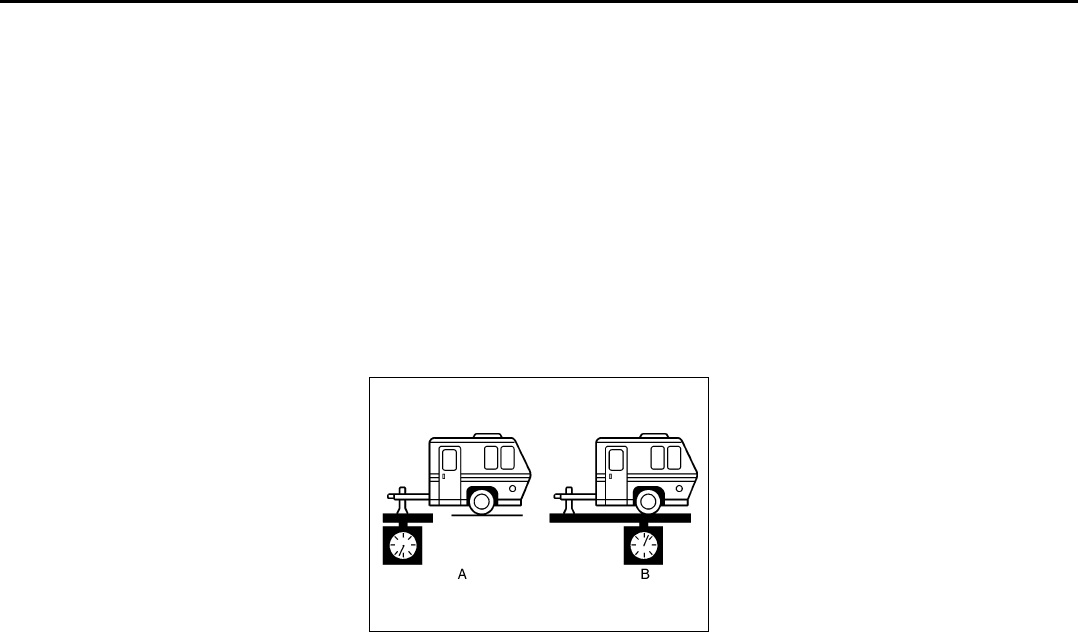
4-22
DRIVING YOUR VEHICLE
78J00-03E
Three important considerations have to do
with weight:
• Weight of the trailer
• Weight of the trailer tongue
• Weight on your vehicle’s tires
Weight of the Trailer
How heavy can a trailer safely be?
Your vehicle can tow up to 2,900 lbs (1300
kg) with up to five occupants or up to 3,500
lbs (1575 kg) with up to two occupants. But
even that can be too heavy.
It depends on how you plan to use your rig.
For example, speed, altitude, road grades,
outside temperature and how much your
vehicle is used pull a trailer are all impor-
tant. It can also depend on any special
equipment that you have on your vehicle,
and the amount of tongue weight vehicle
can carry. Refer to “Weight of the Trailer
Tongue” later in this section for more infor-
mation.
Maximum trailer weight is calculated
assuming only the driver is in the tow vehi-
cle and it has all the required trailering
equipment. The weight of additional
optional equipment, passengers and cargo
in the tow vehicle must be subtracted from
the maximum trailer weight.
You can ask your dealer for our trailering
information or advice, or you can write us
at our Customer Assistance Offices.
Weight of the Trailer Tongue
The tongue load (A) of any trailer is an
important weight to measure because it
affects the total or gross weight of your
vehicle. The Gross Vehicle Weight (GVW)
includes the curb weight of the vehicle, any
cargo you may carry in it, and the people
who will be riding in the vehicle. If you have
a lot of options, passengers, or cargo in
the vehicle, it will reduce the tongue weight
your vehicle can carry, which will also
reduce the trailer weight your vehicle can
tow. And if you will tow a trailer, you must
add the tongue load to the GVW because
your vehicle will be carrying that weight,
too. Refer to “Loading Your Vehicle” in this
section for more information about your
vehicle’s maximum load capacity.
806596
If you are using a weight-carrying or a
weight-distributing hitch, the trailer tongue
weight (A) should be 10 percent to 15 per-
cent of the total loaded trailer weight (B).
Do not exceed the maximum allowable
tongue weight for your vehicle (400 lbs/181
kg).
After you have loaded your trailer, weigh
the trailer and then the tongue, separately,
to see if the weights are proper. If they are
not, you may be able to get them right sim-
ply by moving some items around in the
trailer.
Total Weight on Your Vehicle’s Tires
Be sure your vehicle’s tires are inflated to
the upper limit for cold tires. You will find
these numbers on the Certification/Tire
Label at the rear edge of the driver’s door,
or refer to “Loading Your Vehicle” in this
section. Then be sure you do not go over
the GVW limit for your vehicle, including
the weight of the trailer tongue.
Hitches
It is important to have the correct hitch
equipment. Crosswinds, large trucks going
by and rough roads are a few reasons why
you will need the right hitch. Here are
some rules to follow:
• If you will be pulling a trailer that, when
loaded, will weigh more than 2000 lbs
(900 kg), be sure to use a properly
mounted, weight-carrying hitch and sway
control of the proper size. This equip-
ment is very important for proper vehicle
loading and good handling when you’re
driving.


















